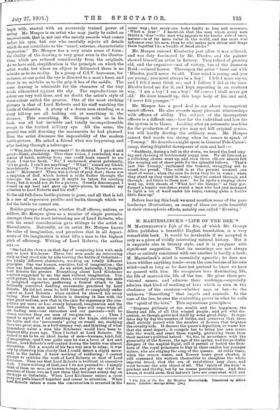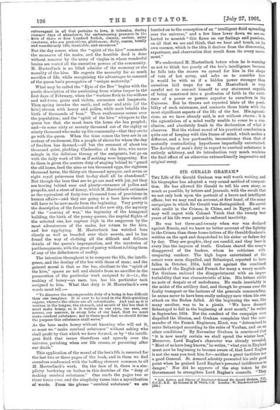M MARTERLINCK'S "LIFE OF THE BEE."*
M. MAETERLINCK'S Life of the Bee, of which Mr. George Allen publishes a beautiful English translation, is a very remarkable book. It would be invaluable if we accepted it only as a piece of vividly interesting natural history. But it is exquisite also in literary style, and it is pregnant with significant suggestion. That its meanings are not always clear or entirely consistent with one another is hardly a fault. ' M. Maeterlinck's mind is essentially agnostic ; he does not know whither anything tends—even the conclusions of his own mind—and so long as he' does not pretend to know we have no quarrel with him. He recognises laws dominating life, the life of manand theilife of the bee. He gives them pro- visional names, and admires their workings,—especially admires that kind of working of laws which is seen in the obedience of the creature—whether man or bee—to the unknown " Something " that impels and controls. In the case of the bee, he sees the controlling power in what he calls the "spirit of the hive." This mysterious principle- " Disposes pitilessly of the wealth and the happiness, the liberty and life, of all this winged people; and yet with dis- cretion, as though governed itself by some great duty. It regu- lates day by day the number of births, and contrives that these shall strictly accord with the number of flowers that brighten the country-side. It decrees the queen's deposition, or warns her that she must depart ; it compels her to bring her own rivals into the world, and rears them royally, protecting them from their mother's political hatred. So, too, in accordance with the generosity of the flowers, the age of the spring, and the probable dangers of the nuptial flight, will it permit or forbid the first- born of the royal princesses to May in their cradles her younger sisters, who are singing the song of the queens. At other times, when the season wanes, and flowery hours grow shorter, it will command the workers themselves to slaughter the whole imperial brood, that the era of revolutions may close, and work become the sole object of all. The 'spirit of the hive' is prudent and thrifty, but by no means parsimonious. And thus aware, it would seem, that nature's laws are somewhat wild and • The Life of the Bee. By Maurice Maeterlinck. Translated by Alfred &Aro. London: (ieorga Allan. Daa
extravagant in all that pertains to love, it tolerates, during summer days of abundance the embarrassing presence in the hive of three or four hundred foolish, clumsy, useless, noisy creatures. who are pretentious, gluttonous, dirty, coarse, totally and scandalously idle, insatiable, and enormous."
But the day comes when the "spirit of the hive" commands the massacre of the males, and the horrible deed is done without remorse by the army of virgins in whose wonderful brains are vested all the executive powers of the community. M. Maeterlinck is no blind admirer of the economy or the
morality of the hive. He regrets the necessity for so much sacrifice of life, while recognising the advantages to concord of the queen bee's prerogative of " unique maternity."
What may be called the " Epic of the Bee " begins with the poetic description of the awakening from winter torpor in the first days of February, when the " workers flock to the willows
and nut-trees, gorse and violets, anemones and lungworts. Then spring invades the earth, and cellar and attic [of the hive] stream with honey and pollen, while each beholds the birth of thousands of bees." Then restlessness comes over the population ; and the " spirit of the hive " whispers to the queen bee that she must leave the home she has peopled ; and—to some sixty or seventy thousand out of the eighty or ninety thousand who make up the community—that they are to go with the queen. When the time comes the bees are in an ecstasy of excitement, like a people of slaves for whom the day of freedom has dawned,—all but the remnant of about ten thousand quiet, plodding Cinderellas of the hive, who never mingle in the delirious throng of the emigrants, but go on with the daily work of life as if nothing were happening. For to them is given the austere duty of staying behind to " guard the old home, feed the nine or ten thousand eggs, the eighteen thousand larvae, the thirty-six thousand nymphs, and seven or eight royal princesses that to-day shall all be abandoned."
But though the bees that are to go are mad with joy, yet they are leaving behind ease and plenty—treasure of pollen and propolis, and a store of honey, which M. Maeterlinck estimates as the equivalent of forty-two thousand tons of provisions in human affairs—and they are going to a bare hive where all will have to be new-made from the beginning. Very pretty is the description of the foundation of the new city, the mystery of the " coming of wax," the ingenuity of the hexagonal building, the birth of the young queens, the nuptial flights of the selected one, her capture high in the empyrean by the most adventurous of the males, her return to the hive, and her egg-laying. M. Maeterlinck has watched bees closely as well as brooded over their secrets, and he has found the way of clothing all the difficult and delicate details of the queen's impregnation, and the mysteries of parthenogenesis, with the grace of poetry without robbing them of any of the definiteness of reality.
The intention throughout is to compare the life, the intelli- gence, and the destiny of the bee with those of man; and the general moral is that as the bee, obedient to the " spirit of the hive," spares no toil and shrinks from no sacrifice in the prosecution of the particular work assigned to it—i.e., the making of honey—so man, too, has his particular task assigned to him. What that duty is M. Maeterlinck's own words must tell To discover the unconquerable duty of a being is less difficult than one imagines. It is ever to be read in the distinguishing organs, whereto the others are all subordinate. And just as it is written in the tongue, the stomach, and mouth of the bee that it must make honey, so is it written in our eyes, our ears, our nerves, our marrow, in every lobe of our head, that we must make cerebral substance ; nor is there need that we should divine the purpose this substance shall serve."
As the bees make honey without knowing who will eat it, so must we " make cerebral substance " without asking who
shall profit by that which we have formed, or by " the intelli- gent fluid that issues therefrom and spreads over the universe, perishing when our life ceases, or persisting after our death."
This application of the moral of the bee's life is reserved for the last two or three pages of the book, and in them we find ourselves confronted with the baffling element common to all M. Maeterlinck's work. On the face of it, there is a sim- plicity bordering on bathos in this doctrine of the " duty of
making cerebral substance." One reads the pages two or three times over, and the simplicity turns into a mystification of words. From the phrase " cerebral substance" we are hurried on to the conception of an " intelligent fluid spreading over the universe," and a few lines lower down we are ex. horted to nourish " this flame on our feelings and passions, on all that we see and think, that we hear and touch, on its own essence, which is the idea it derives from the discoveries, experience, and observation that result from its every move- ment."
We understand M. Maeterlinck better when he is warning us not to think too poorly of the bee's intelligence because he falls into the snares we spread for him in the shape of vats of hot syrup, and asks us to consider how it would be with us if a hidden power stronger than ourselves laid traps for us. M. Maeterlinck is very careful not to commit himself to any statement capable of being construed into a profession of faith in the exist- ence of a power or powers superior to ourselves in the Universe. But he throws out repeated hints of the possi_ bility of such existences, and connects these hints with the most significant aspects of the life of the bee. His,agnosti- cism, as we have already said, is not without charm: it is the agnosticism of a mind really unable to come to a con- clusion, and absolutely frank in the declaration of what it observes. But the violent moral of his practical conclusion is quite out of keeping with this frame of mind, which makes a different, and a less pardonable, inconsistency than that of mutually contradicting hypotheses impartially entertained. The doctrine of man's duty in regard to cerebral substance is entirely arbitrary, and its introduction very much weakens the final effect of an otherwise extraordinarily impressive and original essay.



































 Previous page
Previous page